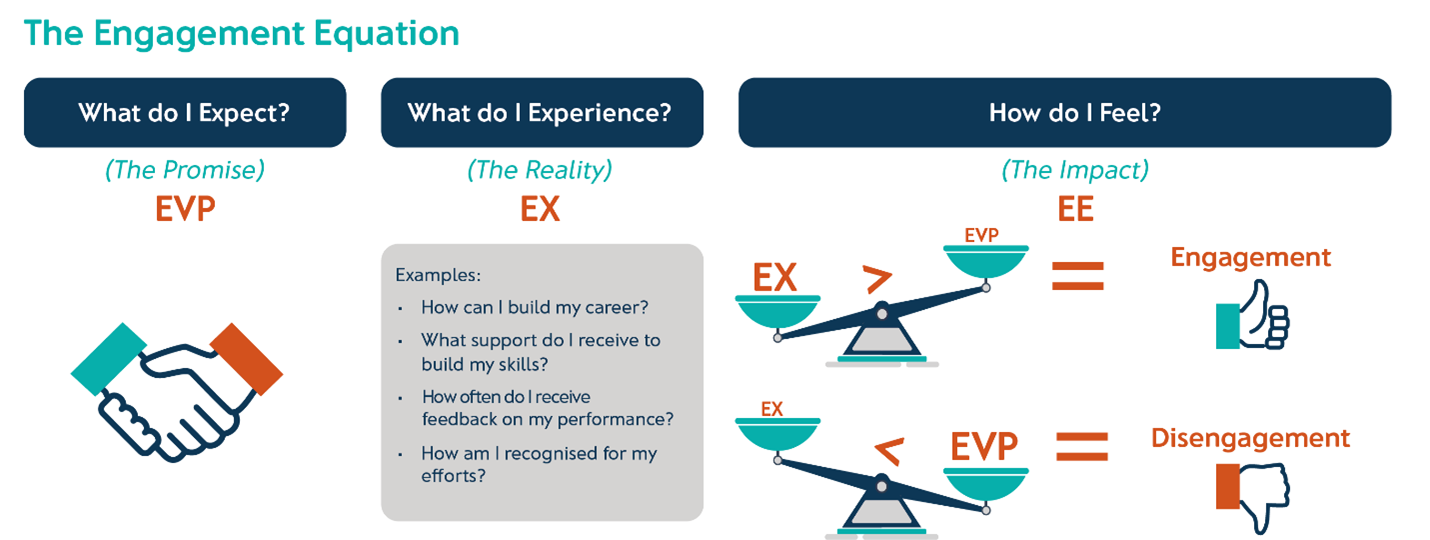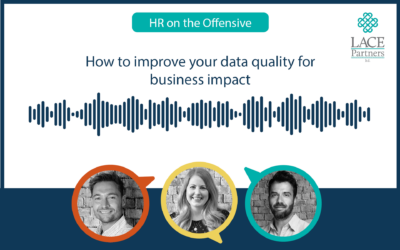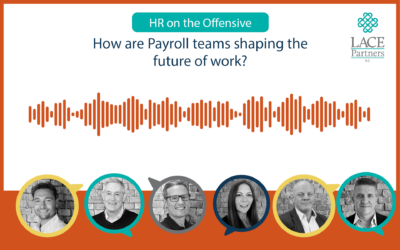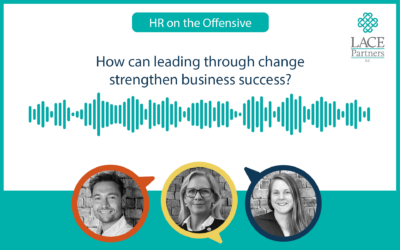What is your employee value proposition (EVP) and how has it changed over time? Has the global pandemic changed it? What is ‘the deal’ you offer your employees and how well do you communicate it? These are just a few of the questions Cathy Acratopulo our Co-Founder and MD and Chris Howard our Marketing Director discussed on the latest HR on the Offensive podcast, summarised for you below.
What is an EVP and why should organisations be thinking about theirs in 2021?
Employee Value Proposition means different things to different people, but the EVP can be seen as the articulation of ‘the deal’. If you are looking for a role within an organisation or are already an employee it is the offer that the business makes to you. In essence, it’s what the reality of working there will be like in a way which attracts you as a candidate or keeps you engaged as an employee.
What makes EVP so important?

There’s a simple equation. When we talk to HR Directors, we discuss the direct correlation between their EVP and their business outcomes. How your EVP (the promise) compares to your employees’ actual working experience (the reality) will either drive or hinder engagement. We know that engagement levels are then directly correlated to performance and productivity i.e. your bottom line.If the experience you have in an organisation (EX) matches or is greater than the promised expectation (the EVP) then your engagement levels are likely to be positive. If the reality is that your experience is less than expectations, then that engagement level may be negative and may impact performance, productivity and retention. As HR professionals, we need to actively manage ‘the promise’ and the expectations you are setting with your candidate and employee pool, whilst also actively managing ‘the experience’ so that it at least matches their expectations (and ideally exceeds them). You are then doing everything you can to maximise engagement and, as a result, drive business value.
How should we differentiate between Employer Brand and EVP?
The terms EVP and Employer Brand are often used interchangeably. In my view they are different concepts. It is often the case that the EVP/Employer Brand is owned by the Talent Acquisition function as it’s focused on attracting candidates to the organisation. However, I would recommend that the EVP is seen as different to the Employer Brand and is developed and owned centrally by the HR leadership team. Your EVP sets out what you can expect, so the more tangible and objective you can make your proposition the better. In comparison, the Employer Brand tends to be more about how you want to be perceived in the market as an employer. It is therefore often more subjective: it might be quite emotive, using simple words and graphics which set the tone about how an organisation wants you to feel. Employer Brand is useful to attract candidates to apply, but the EVP is then important to set realistic expectations to retain successful candidates over time. Organisations often suffer from high turnover rates in the first year of employment. Why is that? Normally it’s because the reality did not match up to the promise. So, the question is how organisations can be more explicit about the ‘deal’ to maximise engagement levels and reduce attrition.
How can HR teams be more specific with their EVP?
The more objective your EVP is, the more you are setting realistic expectations. By doing so you are more likely to meet and even surpass your employees’ expectations and, as a result, improve engagement. My challenge to HR Directors is to consider how they can make the ‘deal’ clearer and more visible. For example, can you give practical details on the frequency of performance feedback, the learning support someone will receive (e.g. number of days or budget) and how they will find out about new job opportunities internally or how they can progress their career. It’s about selecting those experiences you know mean the most to your employees and giving tangible details on what is on offer. Is EVP development a one-off exercise? A marketing brand tends to be something that, once established, is tweaked or refreshed every few years but does not fundamentally change. EVP is different. If you’ve made it tangible it cannot stagnate because the offer you are making to your employees (e.g. how they learn, how they are recognised and rewarded) is likely to change year-on-year. As HR professionals, improving employee experience is what we do. Expectations change over time and how we deliver experiences changes too. It’s never static and therefore the EVP should be reviewed and communicated regularly.
How has EVP been impacted by the pandemic?
What an employee values from their employer has fundamentally changed as a result of Covid-19. Your EVP needs to reflect that changing value set to continue to drive engagement. A focus on employee wellbeing is now table stakes and this needs to be reflected in the deal you offer to candidates and employees. Another shift over the last 12 months is linked to the Black Lives Matter movement which has led to business leaders wanting a renewed focus on D&I. There’s an increased emphasis on recognising the value that diversity can bring. Candidates and employees want to understand how inclusive their organisation is and how this might affect them. The values that a candidate or employee holds dear to them are shifting and, unless you are shifting your EVP to match, you will be missing out on hitting the hotspots of what employees want. Once the economy stabilises, there is a high likelihood that many employees who have been biding their time during the uncertainty of Covid will make decisions to move on. Organisations need to be on the front foot in communicating a compelling EVP to their employees to preserve their talent in 2021/2022. If you have questions and want to discuss how to develop and optimise your Employee Value Proposition, please reach out to our team of experts.






